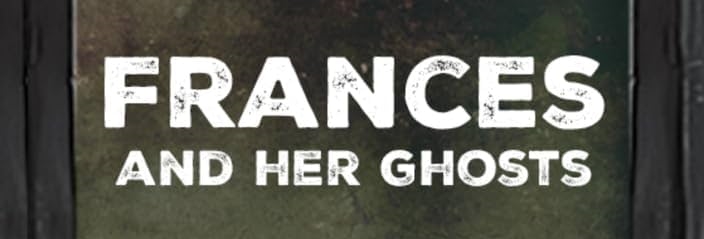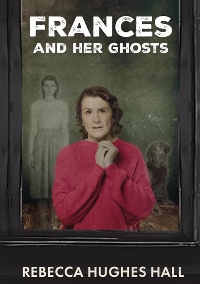Review: Frances and her Ghosts by Rebecca Hughes Hall

I received a free copy of this book from the publicist in return for an honest review.
‘Life exacts a price for Frances Thomas, a writer living an outwardly comfortable existence. Emotionally trapped by an intense empathy with the suffering of animals, she’s compelled to take action for those imprisoned in a laboratory. Always conscious of the cruelties of the world, she reads the wind where others, unaware, wait for the storm to break.
‘Her clear-seeing and emotional identity with human and animal victims causes the edges of her reality to be become blurred when a rescued dog and a long-dead German-Jewish girl in 1930s Berlin – whose story she is scripting for a film – become as one, threatening to break her.’

In Frances and her Ghosts, Rebecca Hughes Hall uses her own experiences as a writer and animal rights activist to breathe life into an alter ego, Frances.
We follow Frances through a short period of high emotion and anxiety. Along with other members of the animal rights group she belongs to, she’s recently liberated a number of dogs from a laboratory, and she worries that she and her co-conspirators will be apprehended, and that the dogs – including one she’s formed a particular attachment to and plans to adopt when the heat dies down – will be found and destroyed.
Not only this, but for her job as a scriptwriter, Frances is reading the diaries of a German-Jewish girl, Franziska, who rebelled against the Nazis and – it can be presumed – died at their hands. The spirited, brave young woman’s words naturally add to Frances’ already heightened emotional state, making it a struggle for her to come out the other side.
Frances and her Ghosts is a slim book of just under 200 pages, but it’s not one you can zip through. This is partly because of the author’s beautiful writing style, which is to be savoured, and partly because it’s such an emotionally intense read.
As well as Frances’ strong feelings about animal testing, and anxiety relating to the illegal activity she’s recently taken part in, she has to process interpersonal conflicts between members of her animal rights group about their priorities and methods, and the contents of Franziska’s diaries on top of that. I think most readers would need to take breathers, especially at a couple of particularly devastating points in the two women’s narratives.
That’s not to say it’s all doom and gloom, though. Every now and again, Frances’ lighter-of-heart husband Joe and her two young sons are able to distract her from her heavy internal weather, and the family’s creatively-named pets are also a sense of entertainment.
A particularly memorable episode occurs when a pair of police officers come to search the Thomas’ house for the stolen dogs. This heart-in-your-mouth moment descends into farce as Joe introduces the canines the family have come by honestly, and one of the officers becomes starstuck when he discovers Joe is the composer of some of his favourite film soundtracks.
Franziska’s story, too, has its lighter moments, as she finds joy in her family and her beloved Bertie. There’s never any question about whether or not she will resist, and carrying out clandestine assignments to undermine the Nazis gives her a sense of purpose and, to some extent, a thrill.
While Frances comes to associate Franziska with the dog she’s set her heart on, because both have been innocent victims of the worst kinds of human cruelty, I mentally drew a stronger line between Frances and her almost-namesake (a coincidence she does remark upon).
Both characters take real action rather than just talking the talk or meekly falling into line, despite the risks and their fears. Perhaps that connection is clearer to an objective outsider than Frances/the author, though, as she’s quite hard on herself and feels like she could always be doing more – a position I could empathise with.
As an educated middle-class white couple who own a large house, Joe and Frances are undeniably privileged, and this was something I had in the back of my mind while I was reading. I came to the conclusion that this made Frances’ willingness to act on her beliefs all the more admirable, as the option was there to look the other way and enjoy her comfortable lifestyle without making waves on behalf of the less fortunate. Additionally, the pair’s acknowledgement of their position and cognisance of the shortcomings of the criminal justice system helped me warm to them.
Something I did struggle with, though, was the book’s frequent changes in perspective. Franziska’s diary entries are broadly distinctive because they’re dated, but sometimes they come to an end with a transition straight back to Frances’ narrative in the following paragraph, and this took some adjusting to.
Similarly, sometimes Frances’ story will be told from an omniscient third-person perspective for a stretch, and then her first-person voice will suddenly break in, in the form of direct addresses to the (absent) dog. There’s also some jumping around in time. I think the use of dinkuses to break up the text, and italics/changes of font to indicate switches between past/present or first-person/third-person would have really helped me keep myself oriented and saved me some confusion.
Frances and her Ghosts is a raw, intense, and beautifully-written semi-autobiographical novel.